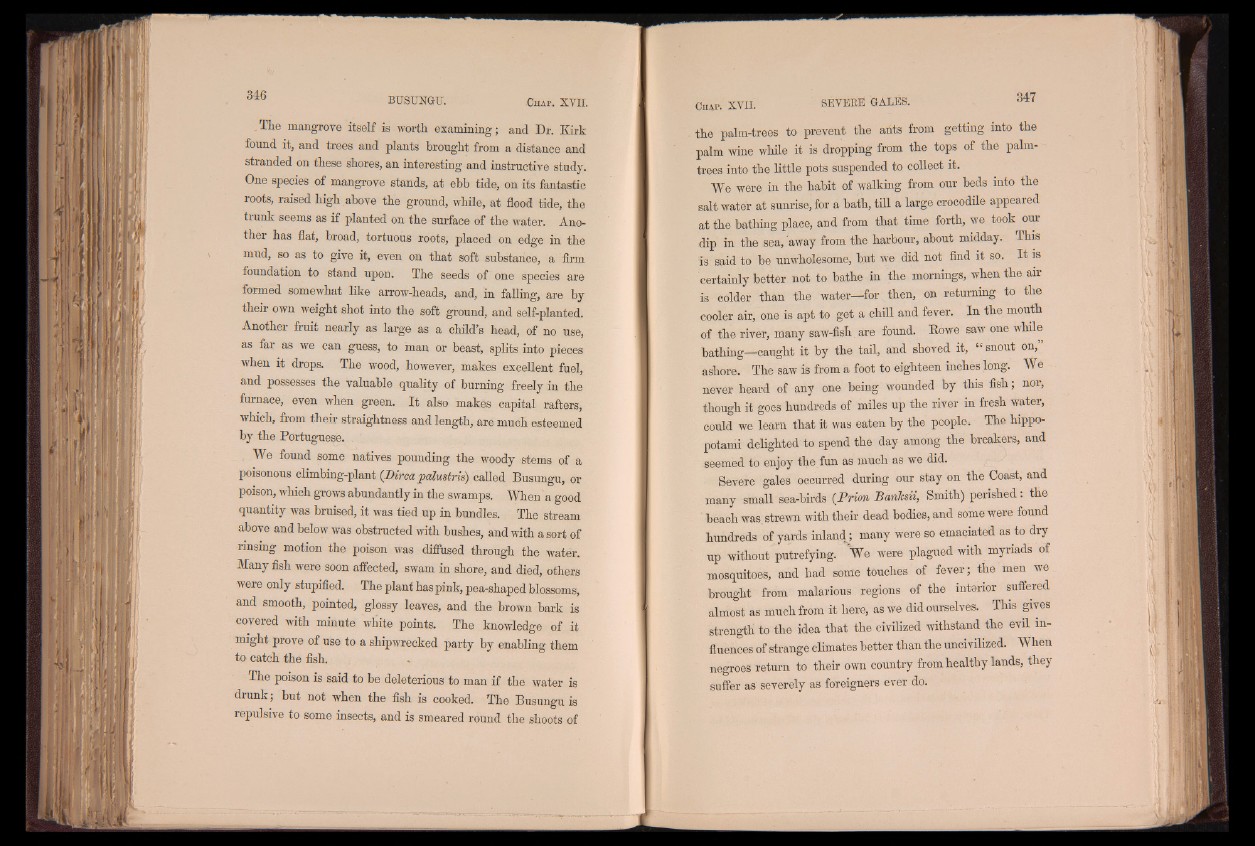
The mangrove itself is worth examining; and Dr. Kirk
found it, and trees and plants brought from a distance and
stranded on these shores, an interesting and instructive study.
One species of mangrove stands, at ebb tide, on its fantastic
roots, raised high above the ground, while, at flood tide, the
trank seems as if planted on the surface of the water. Ann,
ther has flat, broad, tortuous roots, placed on edge in the
mud, so as to give it, even on that soft substance, a firm
foundation to stand upon. The seeds of one species are
formed somewhat like arrow-heads, and, in falling, are by
their own weight shot into the soft ground, and self-planted.
Another fruit nearly as large as a child’s head, of no use,
as far as we can guess, to man or beast, splits into pieces
when it drops. The wood, however, makes excellent fuel,
and possesses the valuable quality of burning freely in the
furnace, even when green. I t also makes capital rafters,
which, from their straightness and length, are much esteemed
by the Portuguese. .
We found some natives pounding the woody stems of a
poisonous climbing-plant (Dirca pcdustris) called Busungu, or
poison, which grows abundantly in the swamps. When a good
quantity was bruised, it was tied up in bundles. The stream
above and below was obstructed with bushes, and with a sort of
rinsing motion the poison was diffused through the water.
Many fish were soon affected, swam in shore, and died, others
were only stupified. The plant has pink, pea-shaped blossoms,
and smooth, pointed, glossy leaves, and the brown bark is
covered with minute white points. The knowledge of it
might prove of use to a shipwrecked party by enabling them
to catch the fish.
The poison is said to be deleterious to man if the water is
drunk; but not when the fish is cooked. The Busungu is
repulsive to some insects, and is smeared round the shoots of
the palm-trees to prevent the ants from getting into the
palm wine while it is dropping from the tops of the palm-
trees into the little pots suspended to collect it.
We were in the habit of walking from our beds into the
salt water at sunrise, for a bath, till a large crocodile appeared
at the bathing place, and from that time forth, we took our
dip in the sea, away from the harbour, about midday. This
is said to be unwholesome, but we did not find it so. I t is
certainly better not to bathe in the mornings, when the air
is colder than the water—for then, on returning to the
cooler air, one is apt to get a chill and fever. In the mouth
of the river, many saw-fish , are found. Eowe saw one while
bathing—caught it by the tail, and shoved it, “ snout on, ’
ashore. The saw is from a foot to eighteen inches long. We
never heard of any one being wounded by this fish; nor,
though it goes hundreds of miles up the river in fresh water,
could we learn that it was eaten by the people. The hippopotami
delighted to spend the day among the breakers, and
seemed to enjoy the fun as much as we did.
Severe gales occurred during our stay on the Coast, and
many small sea-birds (Prim Banhsii, Smith) perished: the
beach was. strewn with their dead bodies, and some were found
hundreds of yards inland^ many were so emaciated as to dry
up without putrefying. 'V e were plagued with myriads of
mosquitoes, and had some touches of fever ; the men we
brought from malarious regions of the interior suffered
almost as much from it here, as we did ourselves. This gives
strength to the idea that the civilized withstand the evil influences
of strange climates better than the uncivilized. When
negroes return to their own country from healthy lands, they
suffer as severely as foreigners ever do.